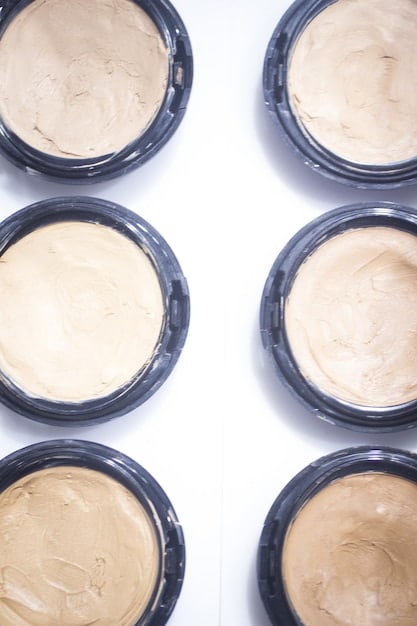How to Choose Foundation for Men: Shade Guide 2025

Choosing the right foundation shade for men involves understanding your skin undertones, testing shades in natural light, and considering the foundation’s finish to achieve a natural, undetectable look.
Finding the perfect foundation shade can be a game-changer in achieving a flawless and natural look. This guide will walk you through everything you need to know to choose the right foundation shade for men: A step-by-step guide for 2025.
Understanding Your Skin Tone and Undertone
Before diving into the world of foundation shades, it’s crucial to understand your skin tone and undertone. Your skin tone is the surface color of your skin, while your undertone is the subtle hue underneath the surface.
Knowing both will ensure you pick a foundation that blends seamlessly and looks natural.
Identifying Your Skin Tone
Your skin tone can be broadly classified into fair, light, medium, tan, and deep. Here’s how to determine yours:
- Fair: Skin burns easily in the sun and rarely tans.
- Light: Skin usually burns before tanning.
- Medium: Skin tans more easily and rarely burns.
- Tan: Skin tans easily and rarely burns.
- Deep: Skin is deeply pigmented and almost never burns.
Understanding where you fall on this spectrum will help you narrow down your foundation options.
Determining Your Undertone
Your undertone is the subtle color beneath your skin’s surface. The main undertones are warm, cool, and neutral.
- Warm: Skin has yellow, peachy, or golden hues.
- Cool: Skin has pink, red, or blue hues.
- Neutral: Skin has a balance of warm and cool hues.
The vein test is a simple method to determine your undertone. Look at the veins on your wrist:
- Blue or Purple Veins: Indicate a cool undertone.
- Green Veins: Indicate a warm undertone.
- Blue-Green Veins: Indicate a neutral undertone.
Understanding your skin tone and undertone is the cornerstone of finding your perfect foundation match.
Choosing the Right Foundation Formula
Foundation formulas vary widely, each catering to different skin types and desired finishes. Selecting the right formula is essential for a comfortable wear and natural appearance.
Consider your skin type and the level of coverage you desire when making your choice.
Liquid Foundations
Liquid foundations are versatile and suitable for most skin types. They offer buildable coverage, ranging from sheer to full.
Ideal for those looking for a natural finish.
Cream Foundations
Cream foundations are thicker and provide more coverage. They are best suited for dry or mature skin, as they offer hydration and a dewy finish.
Avoid using on oily skin as they can feel heavy.
Powder Foundations
Powder foundations are lightweight and great for oily or combination skin. They provide a matte finish and help control shine throughout the day.
They can be applied with a brush or sponge for varying levels of coverage.
Stick Foundations
Stick foundations are convenient for on-the-go application and touch-ups. They offer medium to full coverage and are suitable for all skin types.
They blend easily and are great for concealing blemishes or imperfections.

Selecting the right foundation formula ensures comfort and a flawless finish.
The Importance of Testing Foundation Shades
Testing foundation shades before purchasing is paramount. What looks good in the bottle might not translate well on your skin.
Proper testing ensures you find a shade that disappears seamlessly into your complexion.
Testing in Natural Light
Artificial lighting in stores can be deceiving. Always test foundation shades in natural light for the most accurate match.
This will reveal the true color and how it blends with your skin.
Applying Swatches on Your Jawline
Apply swatches of three different shades along your jawline, blending each one slightly.
The shade that disappears the most is the closest match to your skin tone.
Waiting for the Foundation to Oxidize
Foundation can oxidize (react with the air) after application, causing it to darken slightly. Wait for about 15-20 minutes to see the oxidized color before making a decision.
This ensures the shade stays true to its initial application.
Considering Seasonal Changes
Your skin tone may change with the seasons due to sun exposure. It’s a good idea to re-evaluate your foundation shade during summer and winter.
Having two different shades for different times of the year will ensure a perfect match year-round.
By testing foundation shades correctly, you can avoid mismatched shades and achieve a more natural finish.
Application Techniques for Men
Applying foundation effectively can make a big difference in achieving a natural, undetectable look. The right technique ensures the product blends seamlessly and doesn’t look heavy or cakey.
Less is more. Start with a small amount of product and build coverage gradually.
Using a Makeup Sponge or Brush
A damp makeup sponge like a Beautyblender can provide a natural, airbrushed finish. A foundation brush offers fuller coverage and is great for targeted application.
Dabbing and Blending
Rather than dragging the product across your face, dab and blend the foundation into your skin using small, circular motions. This helps to create a seamless, even layer.
Focusing on Problem Areas
Concentrate the foundation on areas that need the most coverage, such as blemishes, redness, or uneven skin tone. Blend outwards towards the edges of your face to avoid a harsh line.
Setting with Powder
If you have oily skin or want to extend the wear of your foundation, set it with a light dusting of translucent powder. Use a large, fluffy brush to apply the powder to your T-zone and any other areas that tend to get shiny.

Mastering these application tips will enhance the natural look of your foundation.
Common Mistakes to Avoid
Even with the right shade and formula, common mistakes can sabotage your foundation application. Avoiding these pitfalls ensures a flawless, natural finish.
Learn what to avoid to keep your look clean and polished.
Using Too Much Product
Applying too much foundation can result in a cakey, unnatural look. Start with a small amount and build coverage gradually, focusing on areas that need it most.
Not Blending Properly
Failure to blend foundation properly can result in harsh lines and uneven coverage. Pay extra attention to blending along your hairline, jawline, and neck.
Ignoring Your Skin Type
Using a foundation formula that is not suited to your skin type can lead to problems such as excess shine, dryness, or breakouts. Choose a formula that complements your skin’s needs.
Forgetting to Prime
Applying a primer before foundation can create a smooth base, improve the longevity of your makeup, and address specific skin concerns such as oiliness or dryness.
By steering clear of these common errors, you’ll maximize your foundation’s effectiveness.
Top Foundation Recommendations for Men in 2025
With the ever-expanding market, finding the right foundation can be overwhelming. Here are some top recommendations tailored specifically for men in 2025.
These products combine quality, performance, and ease of use to deliver outstanding results.
Sheer to Medium Coverage Options
For men who prefer a natural, undetectable look, sheer to medium coverage foundations are ideal. These formulas even out skin tone without feeling heavy.
- NARS Pure Radiant Tinted Moisturizer: Provides a sheer wash of color with added skincare benefits.
- Kiehl’s Facial Fuel BB Cream: A lightweight formula that hydrates and evens out skin tone.
Medium to Full Coverage Options
If you need more coverage to conceal blemishes or uneven skin tone, opt for a medium to full coverage foundation that still looks natural.
- Tom Ford Traceless Foundation Stick: Offers buildable coverage with a natural matte finish.
- Clinique Even Better Makeup SPF 15: Provides moderate coverage while addressing dark spots and discoloration.
Budget-Friendly Options
High-quality foundation doesn’t have to break the bank. Here are some affordable options that deliver great results.
- Maybelline Fit Me Matte + Poreless Foundation: Controls shine and minimizes the appearance of pores.
- L’Oréal Infallible Pro-Matte Foundation: Long-lasting formula that provides a matte finish for up to 24 hours.
Choosing a recommended foundation makes it easier to find a perfect match for your skin.
| Key Aspect | Brief Description |
|---|---|
| 🔍 Skin Tone & Undertone | Determine your skin tone (fair, light, medium, tan, deep) and undertone (warm, cool, neutral) for a perfect match. |
| 🧪 Foundation Formula | Choose the right formula (liquid, cream, powder, stick) based on your skin type and desired coverage. |
| ☀️ Testing Shades | Always test foundation in natural light. Apply swatches along your jawline and wait for oxidation. |
| 🖌️ Application | Use a makeup sponge or brush, dabbing and blending the foundation. Focus on problem areas and set with powder. |
Frequently Asked Questions
▼
Check the color of your veins on your wrist. Blue or purple veins indicate a cool undertone, green veins suggest a warm undertone, and blue-green veins indicate a neutral undertone.
▼
Yes, you can! Foundation is foundation. Just focus on finding the right shade and formula for your skin type and desired look, regardless of marketing.
▼
Mix two shades together to create a custom blend that perfectly matches your skin tone. Alternatively, you can choose the lighter shade for winter and the darker shade for summer.
▼
Most foundations have a shelf life of 12 to 24 months after opening. Look for changes in texture, smell, or color, which can indicate it’s time for a replacement.
▼
Yes, but make sure to cleanse your skin thoroughly each night to remove all traces of makeup. Use non-comedogenic formulas to prevent clogged pores and breakouts.
Conclusion
Choosing the right foundation shade for men: A step-by-step guide for 2025 involves understanding your skin, selecting the right formula, and mastering application techniques. With these tips, you can confidently achieve a natural, flawless look that enhances your appearance.





